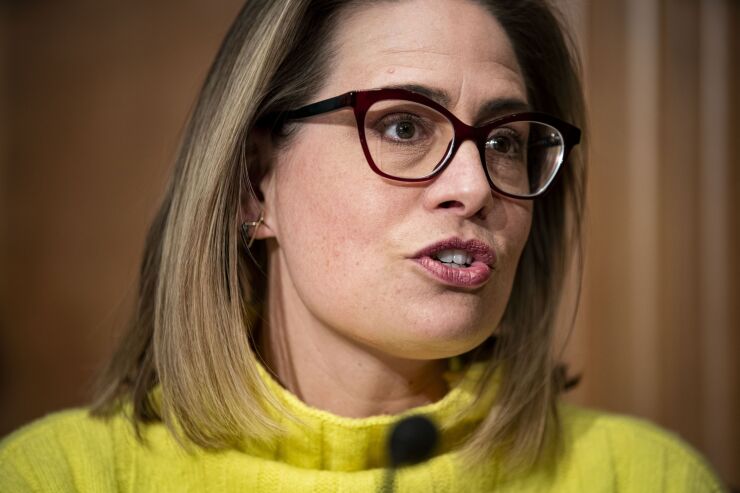Now that Senator Joe Manchin is on board with a $433 billion tax and climate bill, Democrats, Republicans and the private equity industry all are trying to suss out where Senator Kyrsten Sinema stands.
The Arizona Democrat was left out of the negotiations between Manchin and Senate Majority Leader Chuck Schumer, which resulted in legislation that, among other things, would eliminate a tax break for fund managers known as carried interest.

Sinema, whose attention-grabbing style in the staid Senate belies her tight-lipped negotiating tactics, has given no clue about whether she might provide the 50th vote needed to pass the legislation in the Senate. The 46-year-old ignored questions from reporters at the Capitol Monday evening, and her staff gave no signal that anything had changed.
"Senator Sinema does not have a comment," her spokesperson, Hannah Hurley, said earlier Monday. "She's reviewing the bill text and will need to see what comes out of the parliamentarian process."
In the evenly divided Senate, Democrats need all 50 members of their caucus to pass the legislation if all Republicans are present and voting "no." Manchin had been the other holdout blocking more ambitious Democratic initiatives. But with his role in pulling together this latest bill, Sinema becomes the pivotal vote.
Manchin told reporters Monday he hoped to speak to Sinema, who he called "a good friend," as senators filter into Washington after a weekend break.
"I've called and left a message for her," Manchin said as he headed into the chamber for a vote. "I might see her on the floor."
Manchin and Sinema weren't seen speaking on the floor Monday, though it's unclear if the pair talked out of public view. Manchin didn't comment as he left the Senate chamber.
Sinema was the key architect of the final drug provisions in the bill, signing off on them after eliminating a proposed 95% tax on pharmaceutical companies that do not cut prices for those with private insurance.
But she has a long history of throwing up roadblocks to plans backed by more liberal Democrats. She opposed increasing the minimum wage in the March 2021 COVID relief bill, opposes ending the filibuster to pass voting rights and abortion legislation, and fought attempts to hold up the bipartisan infrastructure bill she negotiated last year until a $3.5 trillion social spending bill proposed by progressive was passed. That larger bill later died when Manchin came out against it.
Sinema is the main reason the smaller Inflation Reduction Act proposal now on the table doesn't reverse the Trump-era corporate and individual rate cuts. But it does impose a minimum tax on corporations and eliminates the carried interest break, which has led to heavy pressure from Republicans and industry.
The No. 2 Senate Republican, John Thune of North Dakota, said he talked to Sinema over the weekend but declined to characterize their conversations.
"We're going to argue to her and everybody else for that matter is just that this is a bad time with inflation and a wobbly economy to be raising taxes," Thune told reporters Monday.
Thune pointed to an estimate from the Joint Committee on Taxation that shows that lower-income Americans would pay slightly more in federal levies under the plan. While the bill doesn't directly increase taxes on low and middle-income households, Congress's official tax estimators found that some taxpayers would indirectly bear some of the corporate tax hikes. The committee also found that manufacturers would be the most-affected industry by a 15% minimum tax on corporate profits.
Big private equity firms have been encouraging lobbyists to keep fighting through the week to strike any language that would raise the rate on carried interest.
Private equity's allies encouraged the Arizona Chamber of Commerce and Industry as well as other pro-Arizona business interests to amplify the message to Sinema's staff that the bill hurts business, people familiar with the matter said.
Calls from the buyout industry's allies and lobbyists to Sinema's tax and legislative staff continued through the weekend, a person said.
Talking points that are circulating emphasize private equity's influence in Arizona's economy and how taxing the industry could chill job creation. A number being circulated, originating from research by lobby group American Investment Council, is that private equity-backed businesses have employed some
Sinema isn't expected to oppose all tax changes. But in the past she's indicated that she doesn't support eliminating the carried interest break. That tax perk allows private equity and hedge fund managers to pay lower capital gains tax rates, which top out at 23.8%, rather than the 37% income tax rate, on a portion of their earnings. The senator hasn't publicly explained the reasoning for her stance on carried interest.
"She will likely make a decision on carried interest on her terms and not political pressures from the party," said James Maloney, managing partner at Tiger Hill Partners, which advises investment firms on government policies and does lobbying. "Self-determination is the one consistency to her seemingly unique style of decision making."
Eliminating carried interest is a relatively small change dollar-wise in the context of the $739 billion in tax provisions in the bill. It would only raise about $14 billion additional tax dollars over the course of the decade. If Sinema were to object to repealing carried interest, it could be stripped from the bill without large consequences on other spending priorities, but it could be politically difficult for other Democrats to hand a win to hedge funds and private equity firms.
— With assistance from Steven T. Dennis





